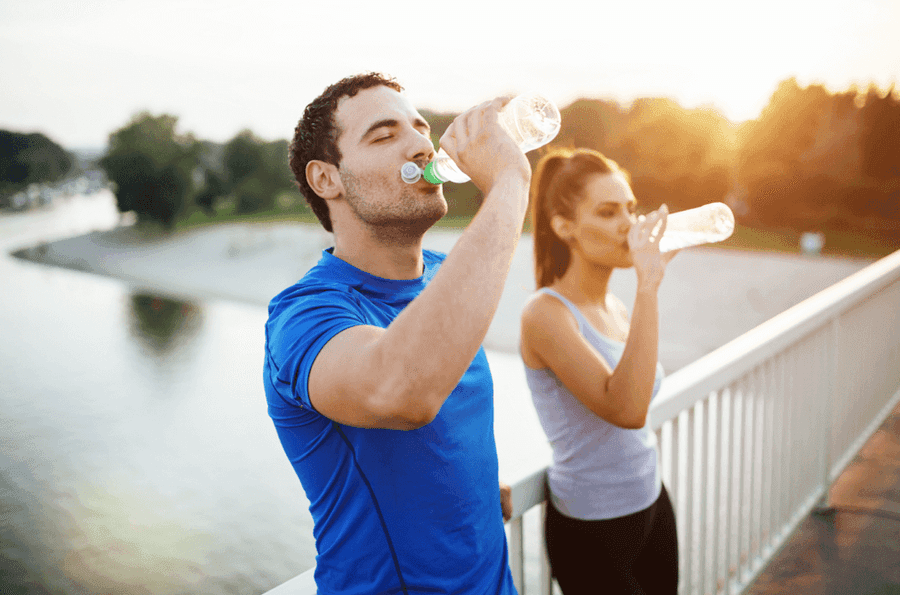Nutrition for Exercise Recovery
by Brooklin White MS, RDN, LDNNutrition
Exercise is an excellent activity for those looking to enhance or maintain brain health. Older adults who engage in consistent, moderately intense exercise have been shown to have higher levels of cognitive functioning, as compared to sedentary adults (1) (2). Exercise has also been associated with increased neurogenesis and long-term potentiation in the hippocampus (3). Nutrition plays a huge role in how the body responds and recovers to any bout of exercise. The main goals for nutrition post exercise include:
- Replenish energy (glycogen) stores for improved recovery
- Nourish the muscles with adequate nutrition for muscle synthesis
- Avoid muscle breakdown/heal any damage that was caused
After a workout, your muscles are ready to accept nutrients to replenish glycogen stores and to encourage muscle growth and repair. There is a “window” per se, that follows an exercise routine that is best for consuming nutrients. This window lasts for about 2 hours post exercise as it allows for glycogen and muscle protein synthesis (MPS)(4). If you practice light physical activity (yoga, gardening, walking, casual biking) you don’t necessarily need any particular post-workout nutrition ‘routine’. The key aspects are to stay hydrated and consume a high-quality snack, if hungry.
What to eat post moderate/vigorous exercise:
Protein:
- After a strength or endurance exercise session, there are microtraumas and tears that occur within the muscle fibers. This muscle damage will trigger muscle cell activity and growth, also known as skeletal muscle hypertrophy. It’s important to provide the body with proteins after these workouts to help rebuild and repair muscle tissue.
- A recent study showed that consuming 30 grams of protein after a vigorous workout session is enough to optimize muscle synthesis (5).
Carbohydrates:
- Exercise encourages the breakdown of muscle glycogen to glucose to be used as immediate energy. One muscle glycogen stores are depleted, the body utilizes glucose from the bloodstream that comes from additional liver glycogen stores. Depleted muscle glycogen stores therefore need to be restored to help repair and regrow muscle proteins that have been broken down.
Fluids and electrolytes:
- Drinking plenty of water is crucial for effective rehydration.
- If exercising for long periods of time or in high temperatures, it is important to reintroduce electrolytes (sodium, potassium, chloride, bicarbonate) as they help regulate nerve and muscle function and help to maintain a proper acid-base balance in the body (6). Remember, most sports drinks contain way too much sugar and can have a detrimental impact on health.
Focus on food quality
Incorporating both protein and carbohydrates as a part of a nutrition recovery meal is vital for restoring muscle function and performance. Although many post work out supplements, snacks, and foods claim to supply all of the macronutrients needed to support recovery, they often also contain many harmful ingredients such as sugars and artificial sweeteners, additives, and stabilizers. Although you should consume calories post-exercise, the quality of the food should never be sacrificed. Feeding the body with proper nutrients rather than junk foods makes a huge difference.
The most important aspect of nutrition recovery is to focus on the quality of food you are eating. Homemade smoothies, avocado toast or a salmon salad are excellent sources of carbohydrates and proteins. Here is an example of a post exercise plant-based meal that can replenish glycogen stores and promote muscle growth:
- Fruit smoothie with 1 cup unsweetened almond milk, ¼ cup raspberries, ½ cup blueberries, ¼ cup zucchini, 1 cup spinach, ½ a cup silken tofu and 1.5 tablespoons of almond butter
Nutrition Facts:317 calories, 20.4 g monounsaturated fat, 24.1 g carbohydrates, 10 g of natural sugar, 13.7 g of protein
- Almond butter on two slices of sweet potato “toast”: 2 slices of raw sweet potato (about ¼ inch thick), double toasted, with 1 tablespoons of 100% almond butter on each slice. Topped with ¼ teaspoon of chia seeds and ¼ teaspoon of hemp seeds.
Nutrition Facts:231 calories, 18.7 g monounsaturated fat, 12.4 g carbohydrates, 4.6 g fiber, 3.3 g of natural sugar, 8 g of protein
Pro tip: If you tend to get sore in specific areas after exercising (back, knee, hip, shoulder, ankles etc.) make sure you ice it.Ice packs or baths allow for the constriction of blood vessels which helps flush out waste products such as lactic acid (7). The cold temperatures also allow for a slowing down of physiological processes which reduces swelling and further tissue breakdown (8).
References
- Cassilhas RC, Viana VA, Grassmann V, Santos RT, Santos RF, Tufik S, Mello MT (2007) The impact of resistance exercise on the cognitive function of the elderly. Med Sci Sports Exerc 39, 1401–1407.
- Dustman RE, Ruhling RO, Russell EM, Shearer DE, Bonekat HW, Shigeoka JW, Wood JS, Bradford DC (1984) Aerobic exercise training and improved neuropsychological function of older individuals. Neurobiol Aging 5, 35–42.
- Farmer J, Zhao X, van Praag H, Wodtke K, Gage FH, Christie BR. Effects of voluntary exercise on synaptic plasticity and gene expression in the dentate gyrus of adult male Sprague-Dawley rats in vivo. Neuroscience. 2004;124:71–79.
- Moore, D. R. (2015). Nutrition to Support Recovery from Endurance Exercise: Optimal Carbohydrate and Protein Replacement.Current Sports Medicine Reports,14(4), 294–300.https://doi.org/10.1249/JSR.0000000000000180
- Paddon-Jones, D., & Rasmussen, B. B. (2009). Dietary protein recommendations and the prevention of sarcopenia. [Miscellaneous Article].Current Opinion in Clinical Nutrition & Metabolic Care,12(1), 86–90.https://doi.org/10.1097/MCO.0b013e32831cef8b
- Cedar Sinai. (2019, October 16).What are electrolytes?A Non-Profit Hospital in Los Angeles | Cedars-Sinai.https://www.cedars-sinai.org/blog/electrolytes.html
- Vaile JM, Halson S, Gill N, Dawson B. Effect of hydrotherapy on recovery from fatigue.Int J Sports Med. 2008;29(7):539-544. doi:10.1055/s-2007-989267
- Vaile JM, Gill ND, Blazevich AJ. The effect of contrast water therapy on symptoms of delayed onset muscle soreness.J Strength Cond Res. 2007;21(3):697-702. doi:10.1519/R-19355.1